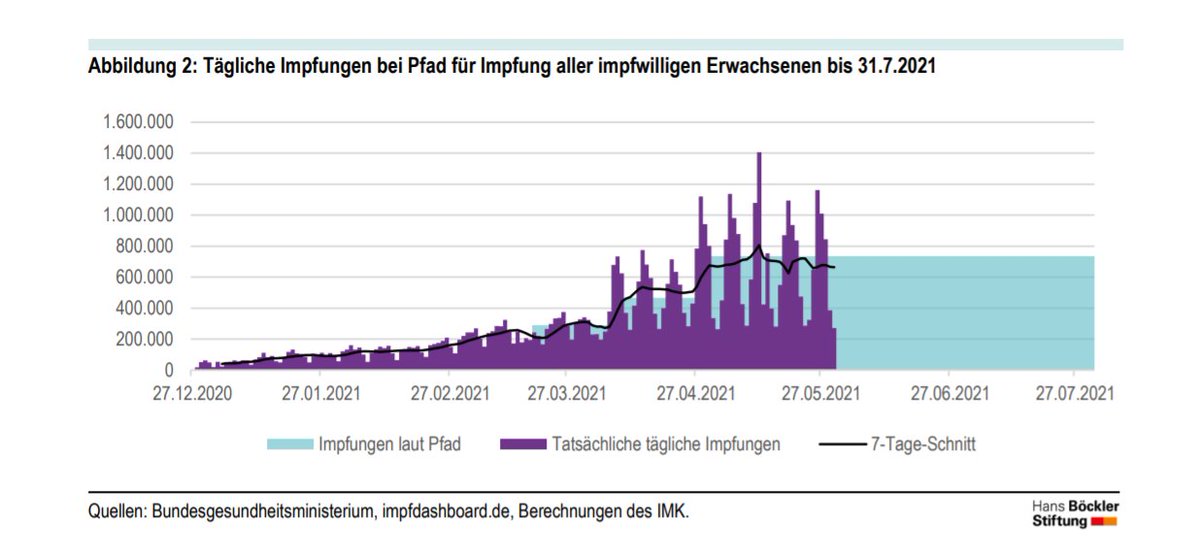
The EU Commission @PaoloGentiloni has just issued a communication on EU economic policy and its coordination - the fiscal rules and those governing so-called macroeconomic imbalances.
ec.europa.eu/info/system/fi…
Mostly light, but some shadows.
Thread 👇
1/n
ec.europa.eu/info/system/fi…
Mostly light, but some shadows.
Thread 👇
1/n
I'll look quickly in turn at
- Next Generation EU
- the (suspension of the) fiscal rules
- monitoring of macro imbalances
2/n
- Next Generation EU
- the (suspension of the) fiscal rules
- monitoring of macro imbalances
2/n
NGEU
Not much new here. COM welcomes the fact that all MS have approved the increase in own resources & almost all have submitted recovery plans. The borrowing-and-disbursing process can begin following COM plan-approval and endorsement by the Council (within 1 month).
3/n
Not much new here. COM welcomes the fact that all MS have approved the increase in own resources & almost all have submitted recovery plans. The borrowing-and-disbursing process can begin following COM plan-approval and endorsement by the Council (within 1 month).
3/n
COM is right that the Recovery & Resilience Facility will ease fiscal constraints on the hardest hit MS; RRF is highly redistributive (imk-boeckler.de/de/faust-detai…).
It's too small overall tho and a longer-run pan-European investment program is missing imk-boeckler.de/de/faust-detai…
4/n
It's too small overall tho and a longer-run pan-European investment program is missing imk-boeckler.de/de/faust-detai…
4/n
MS fiscal policy and fiscal rules
The overall messaging on the need for a cautious pivot and country-specific differentiation is v. welcome. Had we had this in 2011/12 much pain could have been avoided.
Premature withdrawal is indeed not good.
5/n
The overall messaging on the need for a cautious pivot and country-specific differentiation is v. welcome. Had we had this in 2011/12 much pain could have been avoided.
Premature withdrawal is indeed not good.
5/n

The general escape clause of the SGP (eurospeak: suspension of fiscal rules) will apply *throughout* 2022. Welcome! Altho fiscal monitoring will, rightly, continue, MS have another 18 months b4 compliance issues arise.
And 🇪🇺 as a whole has 18 months to reform the rules.
6/n
And 🇪🇺 as a whole has 18 months to reform the rules.
6/n
While the COM does not enter into the rule-reform debate here, the language on the fiscal side - incl. on issues such as the need to maintain investment, avoid unhealthy tax competition etc. - is encouraging. 

Macroeconomic imbalances
Unfortunately the positive appraisal does not extend to the monitoring of macroeconomic imbalances - which, as I have argued for many years (imk-boeckler.de/de/faust-detai…), is as least as important as the fiscal rules themselves.
7/n
Unfortunately the positive appraisal does not extend to the monitoring of macroeconomic imbalances - which, as I have argued for many years (imk-boeckler.de/de/faust-detai…), is as least as important as the fiscal rules themselves.
7/n
COM runs through the long list of indicators for a long list of MS. Claims that, despite the shocks caused by the recent crisis "revision of the classification of imbalances is not warranted". This misses the point. The monitoring system is fundamentally flawed, crisis or not
8/n
8/n
There are too many indicators of in some cases dubious relevance, so that no clear picture and recommendation for counter-action is derived.
And the indicators are skewed ("asymmetric") to focus on debts and deficits, with inadequate attention to surplus countries.
9/n
And the indicators are skewed ("asymmetric") to focus on debts and deficits, with inadequate attention to surplus countries.
9/n
(This notwithstanding that DE & NL are told - once again, in all likelihood without consequence - to reduce their surpluses.)
10/n
10/n
What is needed is a clear and symmetric focus on the cross-border imbalances *between MS*. These relate in particular to diverging rates of price and unit labour cost inflation (competitiveness) and current account positions within EMU. (Rof theW is a different matter.)
11/n
11/n
Corresponding reform proposals were made last year by @IMKFlash: imk-boeckler.de/de/faust-detai…
.@PeterBofinger has just argued in a similar vein for a focus on relative prices/inflation: socialeurope.eu/its-time-to-re…
12/n
.@PeterBofinger has just argued in a similar vein for a focus on relative prices/inflation: socialeurope.eu/its-time-to-re…
12/n
.@sjwrenlewis has made a similar call 4 national fiscal policy to focus on symmetrical stabilisation. (See his piece & my comments:
Last not least the European Fiscal Board has also called for MIP reform and better integration with the fiscal rules.
13/n
https://twitter.com/AndrewWattEU/status/1387380073884487688?s=20)
Last not least the European Fiscal Board has also called for MIP reform and better integration with the fiscal rules.
13/n
To conclude: COM gets a lot right on econ policy & governance in its latest statement. But it needs to rethink its stuck-in-the-mud approach to macroeconomic imbalances
@SDullien @Chris_ptz @repasi @lucasguttenberg @LaszloAndorEU @MarioHolzner @CreelJer @fsaraceno @agnesbq1
/end
@SDullien @Chris_ptz @repasi @lucasguttenberg @LaszloAndorEU @MarioHolzner @CreelJer @fsaraceno @agnesbq1
/end
• • •
Missing some Tweet in this thread? You can try to
force a refresh






